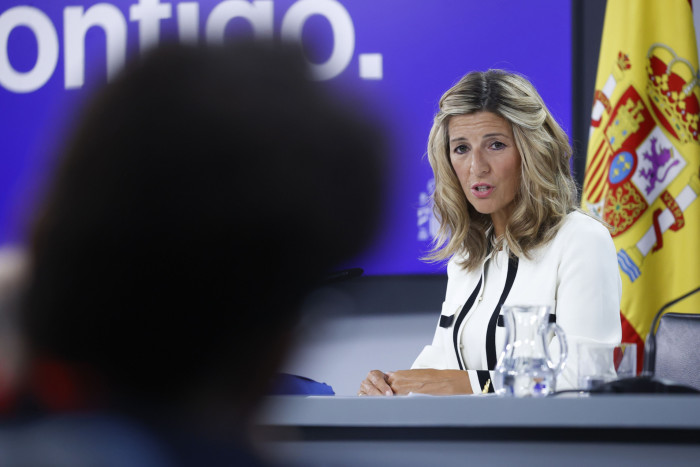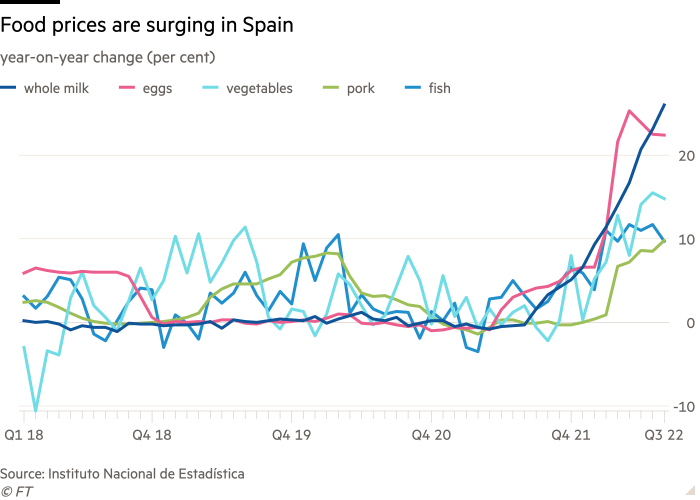Supermarkets in Spain are in the line of fire over inflation as the country’s deputy leader wages a campaign to press shops into cutting prices in an effort to help struggling families.
Yolanda Díaz, one of Spain’s deputy prime ministers and a contender for the top job, has intensified a political battle over living costs by pushing big supermarkets to offer an affordable “basket” of 20 to 30 staples.
Food and energy inflation sparked by the war in Ukraine is stretching family budgets across Europe and leaving governments struggling to limit the damage. Spain is hit especially hard because its relatively low average salaries mean people spend a higher proportion of their income on basics.
In an interview with the Financial Times, Díaz said: “Families are telling me they’re only giving their kids pastas and rice. They can’t access fish or meat. The fruit is very expensive. For a family that has two or three kids, it’s extremely complicated. That’s the urgent issue this country has.”
She said retailers had a duty to cut prices to help consumers, not least because the government had used public funds to support them and other businesses during coronavirus pandemic lockdowns.
“They have profit margins that permit them to reduce their profits a little and contribute to their country,” she added. “If they don’t act in this grave moment for Spain, the reputational risk for them is very high.”
Consumer price inflation stood at 10.5 per cent in Spain in August but prices of food and drink rose 13.8 per cent year-on-year, the biggest increase since the data series began in 1994, according to official figures this week. Milk inflation is running at 26 per cent.

Díaz, a longstanding member of the Communist party, stressed that she was not proposing legislation or state-mandated price controls, but was instead pushing for an “agreement” between business and government to ensure the prices of good-quality basic goods are accessible.
Her efforts have run into firm opposition. The supermarket sector says they are unhelpful even as Díaz invites its representatives for more meetings next week. Spain’s competition regulator, meanwhile, put out a statement recalling that fixing maximum prices between companies is prohibited by national and EU law.
In addition to being criticised by the reliably hostile opposition People’s party, Díaz has also been upbraided by members of her own coalition government.
Díaz, who is also labour minister, is one of Spain’s most watched politicians. She is a junior partner in the government led by Socialist prime minister Pedro Sánchez, but has already signalled a potential challenge to him in elections next year by launching a new political movement called Sumar.
Commenting on her move, Sánchez this week said there was a need for shared responsibility in business. “We have to have a balanced analysis between what the production chain represents and, logically, retail.”
Ignacio García Magarzo, head of Asedas, a group representing supermarkets and distributors, acknowledged the “grave” cost challenge facing companies and consumers but said Díaz’s proposal was “not useful for solving the problems”. He added that her analysis of profit margins in the food supply chain was not scientific.

García Magarzo said trying to press only the biggest supermarkets into action created unwarranted division in the sector. It failed to recognise the fragmented nature of much of Spanish retail and risked leaving shoppers who did not have access to the largest chains abandoned.
He called on the government to instead temporarily slash or eliminate sales tax to tame inflation — and noted that Germany reduced its sales tax in 2020.
The only supermarket to go some way towards complying with Díaz has been the Spanish branch of Carrefour, which said it would offer a basket of 30 “essential” products for €30 until January — replicating something it has been doing in France since June.
The products include Carrefour-branded canned food, pasta, cooking oil and coffee along with a selection of drugstore items and cleaning materials.
But after its announcement, Díaz said: “The basket has to contain products that are fresh — meat, fish, fruit, vegetables and dairy products.” Spain’s other big chains are Mercadona, Lidl and Dia.
Agriculture minister Luis Planas, a member of Sánchez’s Socialist party, rebuked his fellow cabinet member, citing the need to protect smaller retail chains. “We must avoid price wars that would lead to a restructuring of the sector that is not in anyone’s interest,” he said.
Defence minister Margarita Robles accused Díaz of straying into an area beyond her ministerial remit. “I know that [Díaz] does it with the best will, but there are technical and economic aspects that need to be known.”
Farmers across the continent are under immense pressure because of the surging cost of energy and fertiliser, which adds to the difficulty of keeping prices low.
Alberto Núñez Feijóo, leader of the People’s party, said: “We have seen once again the frivolity with which people’s important issues are treated. The meat, dairy and vegetable producers can no longer cope because they have to pay more for everything . . . Not taking into account that producers can no longer manage seems to me to be the opposite of any reasonable proposal from the government.”


